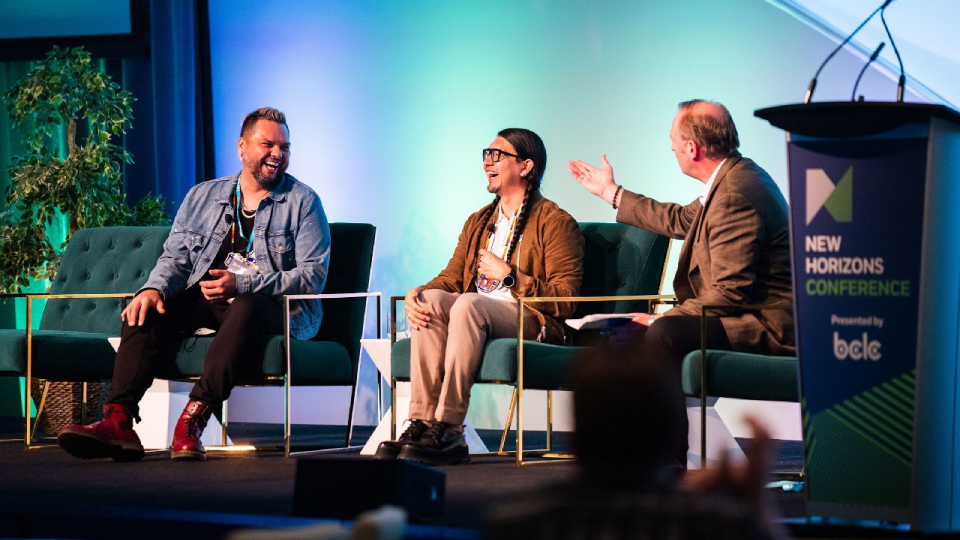At BCLC’s 11th annual New Horizons in Responsible Gambling Conference earlier this month, more than 250 leaders, researchers and policymakers in the gambling industry came to Vancouver to reconnect and rediscover the power of player health. Bringing different perspectives from every province in Canada and across the United States and Europe, delegates engaged in critical dialogue that examined the industry’s approach and explored innovative strategies to support healthier play. Throughout the conference’s 14 sessions, crowds were filled with a sense of renewed enthusiasm to learn from each other and continue working together to advance our shared goal: reducing the potential of harm among our players.
Keynote: Dr. James Makokis & Anthony Johnson
“To make progress, you have to learn to be comfortable with being uncomfortable,” said Dr. James Makokis of the Amazing Two-Spirit Couple, the keynote speakers who kicked off the conference. As the first two-spirit, Indigenous married couple to win the Amazing Race Canada, Dr. Makokis and Anthony Johnson were candid and personal about their experiences and the historical experience of their communities.
We learned about the principles of Indigenous health and knowledge systems and we considered how colonization – which collapsed those Indigenous systems – is connected to the experience of risky play for Indigenous peoples. Pointing to data that showed Indigenous peoples are 2-4x more likely to experience risky gambling than non-Indigenous peoples, Dr. Makokis posed the question: How can we address this together? “Games like the Handgame have traditionally been used as a form of healing for Indigenous peoples,” said Johnson. “It still is – and can still be – an opportunity for intergenerational healing. Let’s change the way it works.”
Understanding Emerging Forms of Gambling: Luke Clark, Lucas Palmer, Eliscia Sinclair, Raymond Wu
In another session, Dr. Luke Clark, Director of Gambling Research at the University of British Columbia (UBC), and his graduate students presented their research into emerging forms of gambling, such as video game loot boxes, gambling livestreams on the Twitch platform, and the function of cashing out among individuals who engage in in-play sports betting. Dr. Clark presented his findings after testing the ‘migration’ from video game loot boxes to conventional gambling. “This study provides the first evidence that greater loot box use predicts future gambling,” said Dr. Clark. “This could suggest the need for enforcement of age restrictions, either of loot boxes within games, or of games containing loot boxes.”
Later, one student, Raymond Wu, discussed his research into the effects of watching gambling livestreams on Twitch. Testing whether watching the streams produces a regulation motive (curtailed desire to gamble) or an evoked craving (increased desire to gamble), Wu concluded, “Evoked craving and regulation motive were both correlated with problematic gambling. However, regulation motive does not always fail, and using gambling streams as self-regulation may alleviate cravings for risky play.” Research like that presented by these students from UBC is key to helping our industry consider new player health safeguards.
Addressing Stigma (For Real): Jay Robinson, Heather Grieve, Ryan McCarthy, Stacy Shaw
“’Responsible gambling’ is dead,” declared Jay Robinson at the top of a panel focused on addressing stigma in the industry. Robinson reminded us that even though we’ve made progress away from certain stigmatizing language (such as ‘pathological’ or ‘compulsive’), language continues to change, and even the best intentions behind these terms don’t help people access tools when they are made to feel shame.
Over the course of the session, panellists discussed ways that their jurisdictions are reducing stigma, like re-branding BCLC’s Game Break program and treating player health tools as part of the customer experience. “If we’re only talking with customers about player health when they’re having problems, then we have missed so many opportunities,” said Robinson. “If people are struggling, they’re not having a good experience. Providing tools is part of customer care, not just your ‘responsible gambling’ program.”
What Do We Know About Winners and How Can We Support Them: Laurie Norman, Melissa Salmon, Sasha Stark
During a panel about the impacts of winning on players, speakers shared key insights from research and programs that are in place to support winners around the world. Sasha Stark of GREO identified how early big wins are associated with increased gambling frequency and problems among adolescents and adults because increased gambling fallacies lead to a higher expectation of future wins.
In terms of providing support, timing might be key. “Sustainable win information may be most effective within one month after their jackpot and may lose its effectiveness six months later,” said Melissa Salmon of the Responsible Gambling Council. Laurie Norman of SaskGaming Corporation pointed out how the best time to talk to players is when they are winning. To illustrate, Stark discussed an example from the UK National Lottery, which assigns a winner’s advisor to those who win over £50,000 and provides them with a panel of independent financial and legal advisors.
From Vice to Virtue: Peter ter Weeme
“We have a reputation issue in the gambling industry,” began Peter ter Weeme, BCLC’s Chief Social Purpose Officer. In his session focusing on the way we can transform the industry through social purpose, ter Weeme identified three key themes for building a strategy: creating community; behaviour change; and risk literacy.
The interactive session posed questions to the audience around these themes, asking members of the industry to think about how we can collaborate and motivate players to better understand risk. As the session wrapped, ter Weeme invited the industry to keep thinking about it by taking one action to help transform the perception of gambling from ‘vice to virtue.’ “It’s through social purpose that we invite our players to contribute to the change that we are making towards a better world,” ter Weeme concluded.
To access speakers’ presentations and stay connected with New Horizons, please visit: https://horizonsrg.bclc.com/
